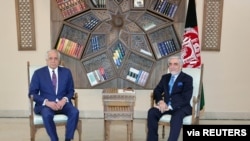U.S. special envoy to Afghanistan Zalmay Khalilzad met Monday with Afghan President Ashraf Ghani and Abdullah Abdullah, head of Afghanistan’s peace council, to discuss steps for accelerating a process that could end decades of war in the country.
“We discussed the peace process, talks in Doha, the US current review & the steps forward,” tweeted Abdullah, who heads the High Council for National Reconciliation (HCNR).
The State Department announced Sunday that the aim of Khalilzad’s trip is to resume discussions with all parties, including the Taliban and regional countries, to find a way to achieve “a just and durable political settlement and permanent and comprehensive cease-fire.”
This is Khalilzad’s first trip to the region since U.S. President Joe Biden took office. It comes after the negotiation teams of the Afghan government and the Taliban met in Doha last week following more than a month of hiatus.
The visit also comes exactly a year after the United States signed an agreement with the Taliban in Doha that the Biden administration is now reviewing.
The deal paved the way for a majority of U.S. troops to withdraw from the country and direct talks to start between representatives of the Afghan government and the insurgent group.
However, it also angered the Afghan government, which felt the U.S. excluded it from the process and promised too much to the insurgents.
The deal called for the removal of all foreign troops from Afghanistan by May 1, 2021. However, increased violence in the country, along with reports that the Taliban have failed to cut ties with al-Qaida as per the Doha agreement, have forced the Biden administration to review the deal and the deadline for withdrawal of troops.
The Taliban have warned that any deviation from the deal could lead to serious consequences.
U.S. Representative Michael McCaul, the top Republican on the House Foreign Affairs Committee, said in an interview Monday with VOA’s Afghan Service that the Taliban would overrun Afghanistan if there were a complete withdrawal of U.S. forces, which would lead to a “pre-9/11-type posture” in the country and create a “long term problem with terrorism.”
Representative McCaul said the deal should have come with certain conditions on the Taliban, including breaking all ties with al-Qaida, instead of a definite withdrawal date for foreign troops. He also said the original agreement should have included a complete cease-fire and a provision calling on the Taliban to stop the killing of innocent civilians and Afghan military forces.
McCaul said the concentration of power in the central government in Kabul has been a problem ever since the U.S. overthrew the Taliban-led government in 2001 in the aftermath of the September 11, 2001 attacks on the United States led by al-Qaida. He said an eventual peace deal should include the transfer of some power from the central government in Kabul to local tribal provinces.
Sayed Eshaq Gailani, a member of the leadership council of the HCNR, said it was important for Khalilzad to discuss a delay in troop withdrawal with the Taliban or else they would increase the level of violence in Afghanistan which was already too high as per NATO and U.S. officials.
According to Afghanistan’s human rights body, the Afghan Independent Human Rights Commission (AIHRC), the war in Afghanistan continued despite the signing of the U.S.-Taliban deal and 8,500 civilians either killed or wounded last year.
AIHRC spokesman Zabihullah Farhang said target killings increased three-fold during the past year.
U.S. Secretary of State Antony Blinken told Abdullah last week that the U.S. supported a “durable political settlement and permanent and comprehensive cease-fire in Afghanistan.”











